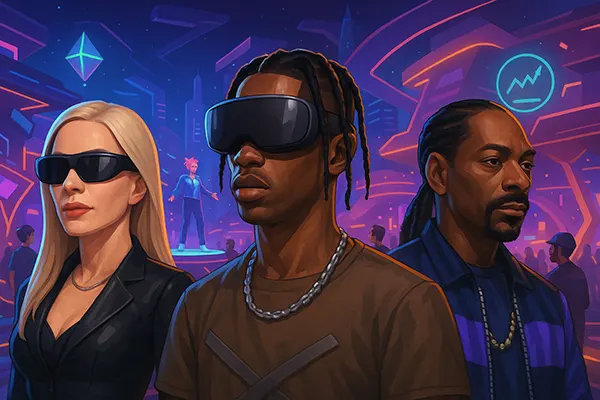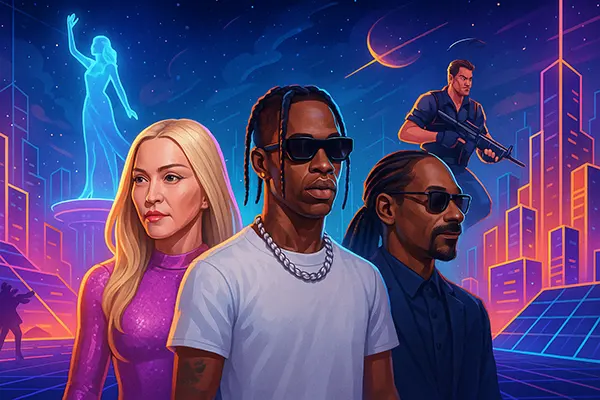
Celebrities in the Metaverse: Who’s Investing in Virtual Worlds in 2025
Virtual worlds have become a new playground not only for gamers and tech enthusiasts but also for global celebrities. In 2025, the intersection of fame, investment, and immersive digital spaces is no longer futuristic — it’s the current reality. From high-profile concerts to multi-million dollar virtual land deals, the metaverse has evolved into a serious entertainment and financial sphere attracting stars from music, film, and beyond.
Virtual Performances by Madonna and Travis Scott
In 2025, Madonna and Travis Scott continue to pioneer the future of performance art through the metaverse. Travis Scott’s earlier success in Fortnite paved the way for his latest fully immersive 3D concert in Roblox’s revamped platform, drawing over 18 million attendees across multiple sessions. The show integrated spatial sound, avatar dance synchronicity, and in-game collectibles, setting a new standard for digital music events.
Madonna, known for her innovation, staged a holographic arena tour in Decentraland that allowed fans to interact with her digital twin. Each song was performed in visually stunning virtual environments that changed dynamically in real time, blending storytelling, AI choreography, and NFT ticketing. Her collaboration with renowned digital artists transformed the event into an artistic exhibition, beyond a mere concert.
These events demonstrate that virtual performances are no longer gimmicks but an evolving medium for artists to connect with global audiences without geographical constraints. Ticket sales, merchandising, and even backstage VIP experiences are now monetised through blockchain technologies, offering fans exclusive access and long-term digital memorabilia.
Impact on Fan Engagement and Revenue Streams
Virtual concerts allow for unprecedented audience engagement. Unlike traditional venues, the metaverse provides scalable spaces, adaptive environments, and layered interactivity. Fans can purchase digital outfits, unlock special content, and share experiences with others regardless of location, time zone, or financial status.
Revenue from these concerts now surpasses many traditional live tours. In addition to ticket sales, artists generate income from NFT merchandise, avatar skin sponsorships, and exclusive behind-the-scenes content sold as blockchain assets. This is shifting how the entertainment industry measures success and profitability.
The integration of AI-driven personalisation has also been a game-changer. By analysing fan behaviour, artists and organisers tailor experiences to each user, enhancing satisfaction and increasing participation. This granular data collection further allows stakeholders to forecast demand and build future campaigns more effectively.
Hollywood Actors in Metaverse-Based Games
Hollywood’s elite have not only voiced characters in video games but have become digital protagonists themselves. In 2025, actors like Keanu Reeves, Charlize Theron, and Pedro Pascal are featured as interactive avatars in sprawling metaverse-based games such as “Elysium Online” and “NeoWars.” These games blend role-playing with real-time story progression controlled by live players.
Keanu Reeves co-developed a cyberpunk-themed narrative game where players can collaborate with his AI avatar on missions across a dystopian virtual city. His real-life involvement extends to dialogue development and storyline input, offering an authentic feel that fans deeply appreciate.
Charlize Theron has become a leading figure in action-adventure metaverse gaming. Her likeness and voice are featured in “Stellar Frontier,” a space-based MMO. Her character isn’t merely decorative — it evolves based on community decisions and direct engagement, making her role dynamic and unpredictable.
Celebrity Integration in Game Development
More celebrities are now co-producing metaverse games, not just lending their image or voice. Their influence reaches design meetings, storyboarding sessions, and gameplay mechanics. This deep involvement ensures a more authentic brand fit and enhances the quality of the end product.
Gaming studios benefit enormously from this synergy. Star power not only boosts marketing but also lends legitimacy to the platforms among wider audiences. A game featuring an A-list actor tends to outperform competitors in downloads and engagement metrics within weeks of launch.
Additionally, in-game celebrity avatars often serve philanthropic purposes. Pedro Pascal’s metaverse campaign has raised over $3 million in crypto donations for refugee support initiatives. This shift illustrates how digital spaces can become platforms for activism and social impact, not just entertainment.

Which Celebrities Are Investing in the Metaverse
As of February 2025, an increasing number of celebrities are investing directly into metaverse platforms, virtual real estate, and blockchain-backed startups. Paris Hilton, Snoop Dogg, and Jimmy Fallon have diversified their investment portfolios with assets tied to platforms like The Sandbox, Spatial, and Gala Games.
Snoop Dogg owns multiple parcels of land in The Sandbox, collectively dubbed “Snoopverse,” where fans can attend events, buy custom NFTs, and interact with gamified versions of the artist’s persona. He has also partnered with several indie game developers to launch decentralised metaverse experiences under his brand.
Paris Hilton has funded the development of a virtual fashion district within Roblox and supports metaverse-native brands. Meanwhile, Fallon has become a shareholder in an emerging metaverse development studio focused on creating digital comedy venues and AI-powered content distribution platforms.
Crypto Adoption Among Celebrities
Celebrity investors are increasingly integrating cryptocurrency strategies into their metaverse ventures. Token-based fundraising and DAO (Decentralised Autonomous Organisation) participation have become common among high-profile names. For instance, Lindsay Lohan backed a token project for virtual film production, granting voting rights to holders on casting and script development.
Such investments signal a shift in how celebrity-backed projects are governed. Instead of centralised management, these initiatives often use community-based voting mechanisms and smart contracts to execute operations transparently. This appeals to digitally native fans and early adopters of decentralised systems.
With financial advisors becoming fluent in blockchain and celebrities actively participating in investor summits within the metaverse itself, the landscape in 2025 shows a unique convergence of technology, finance, and culture driven by popular figures.






